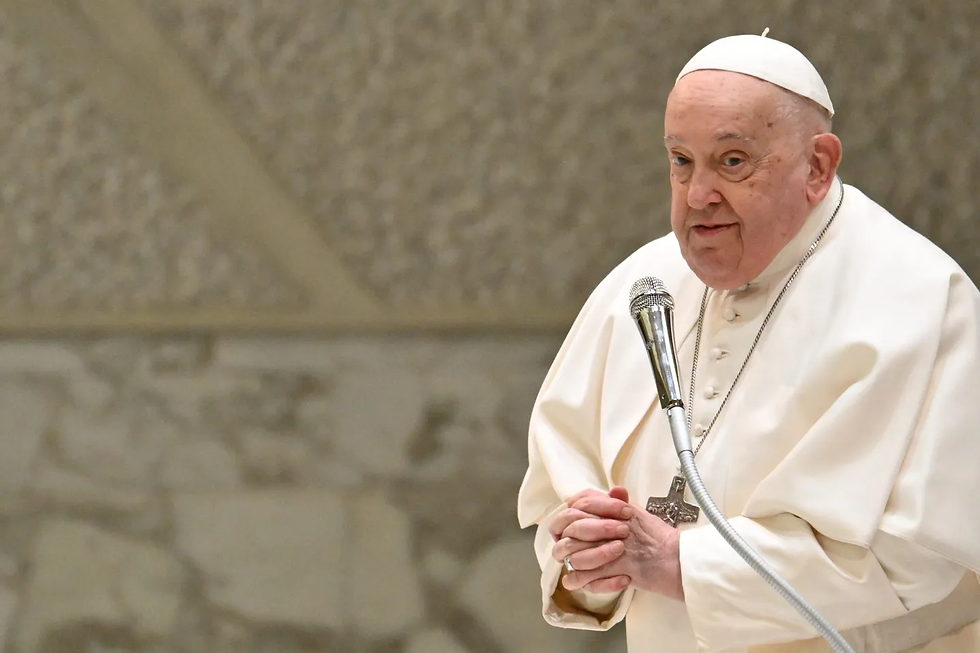Pope Francis: Faith, Politics, and the Modern World
- Rahmani Khoshnaw

- Apr 23, 2025
- 3 min read
Khoshnaw Rahmani, JadeTimes Staff
K. Rahmani is a Jadetimes news reporter covering Politics.

A Humble Beginning
Born in Buenos Aires, Argentina, into a working-class family.
Worked as a janitor, nightclub bouncer, and chemical technician before entering the priesthood.
Ordained as a Jesuit priest in 1969, later becoming Archbishop of Buenos Aires.
Pope Francis, originally Jorge Mario Bergoglio, grew up in Argentina as the son of Italian immigrants. His early life was shaped by humility and practical work, giving him a deep understanding of everyday struggles. Before dedicating himself to religious life, he worked in multiple fields, including as a janitor, nightclub bouncer, and chemical technician.
In 1969, he took his vows as a Jesuit priest, eventually rising to Archbishop of Buenos Aires in 1998. His leadership focused on direct community engagement, humility, and advocating for the poor, shaping his future approach as Pope. His election in 2013 marked a shift in Vatican leadership, making him the first Latin American and Jesuit Pope and signaling a commitment to reform.
Religious Reform and Social Justice
Advocated for LGBTQ+ inclusion with a more compassionate approach.
Removed the death penalty from official Catholic teachings.
Increased Vatican transparency, addressing clerical abuse scandals.
From the moment he assumed the papacy, Pope Francis worked to make the Church more accessible. His stance on LGBTQ+ inclusion was groundbreaking, famously stating, "Who am I to judge?" when asked about gay Catholics. This response reflected a significant shift in tone, favoring compassion over strict traditionalism.
One of his most notable doctrinal changes was removing the death penalty from Catholic teachings, reinforcing the Church’s position on mercy and human dignity. His efforts to modernize Vatican operations also led to abolishing pontifical secrecy in clerical abuse cases, ensuring victims had the opportunity to seek justice.
Political Influence and Global Affairs
Climate Advocacy and Environmental Leadership
Issued Laudato Si' (2015), calling for global action on climate change.
Positioned the Vatican as a leader in sustainability efforts.
Urged corporations and governments to prioritize environmental responsibility.
Climate action was central to Pope Francis' leadership. In 2015, he released Laudato Si', an encyclical urging governments and businesses to implement sustainable policies. He consistently framed climate change as a moral issue, emphasizing that environmental destruction disproportionately affects the world's poorest communities. His advocacy positioned the Vatican as a key voice in global sustainability discussions.
Diplomatic Outreach and Conflict Resolution
Strengthened relationships between Christianity, Judaism, and Islam.
Became the first Pope to visit Iraq, promoting interfaith harmony.
Played a role in improving U.S.-Cuba diplomatic relations.
Pope Francis actively sought unity among religious groups, engaging in interfaith dialogue with Christian, Jewish, and Muslim leaders. His historic visit to Iraq in 2021 marked a significant moment, promoting reconciliation in a region long affected by religious conflicts. He also contributed to U.S.-Cuba diplomacy, advocating for humanitarian cooperation between the two nations.
Economic Critique and Social Inequality
Warned against the dangers of unchecked capitalism.
Urged global leaders to implement fair economic policies.
Called for greater protection of workers and the poor.
A strong advocate for economic justice, Pope Francis frequently criticized wealth-driven economic systems, arguing that they prioritized corporate profits over human dignity. His speeches encouraged fair wages, poverty alleviation, and greater protections for marginalized communities, urging world leaders to consider ethical responsibilities in financial decision-making.
Legacy and Future of the Church
Redefined the papacy by bridging faith and activism.
Influenced policies on climate change, human rights, and economic equity.
Left uncertainty about whether his successor will continue his reforms.
His tenure modernized Vatican leadership, integrating Catholic teachings with contemporary global issues. His influence shaped conversations on social justice, diplomacy, and environmental responsibility beyond religious circles. With his passing, the future of the Church remains uncertain—whether his successor will continue his progressive vision or return to more conservative traditions remains to be seen.
Legacy and Impact
Transformed the Catholic Church’s role in modern society.
Balanced religious tradition with progressive leadership.
Created a legacy that continues to shape faith and global policies.
Pope Francis redefined religious leadership, blending faith with activism and diplomacy. His commitment to climate advocacy, human rights, and economic fairness extended his influence beyond religious institutions into global policymaking. His legacy will continue shaping discussions on inclusivity, diplomacy, and ethical governance, ensuring that his impact endures for generations.








































Comments